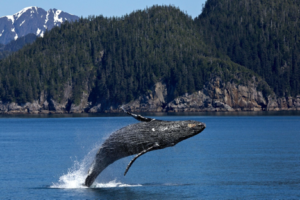Ecotourism Examples That Don’t Work
 As scientific data about climate change and dwindling animal populations has sparked human interest in conservation issues, sustainability as a movement has become immensely popular. Although 22 million dollars have been spent on environmental education, and another 11 million towards wildlife protections, many people in the tourism and hospitality industries still don’t realize all of what factors into conservation.
As scientific data about climate change and dwindling animal populations has sparked human interest in conservation issues, sustainability as a movement has become immensely popular. Although 22 million dollars have been spent on environmental education, and another 11 million towards wildlife protections, many people in the tourism and hospitality industries still don’t realize all of what factors into conservation.
The tourism industry is widely recognized as often being harmful towards conservation, which is why ecotourism has grown in as a sub-industry for tourists who don’t want to be a part of the problem. However, although they mean well, those who run ecotourism ventures often don’t do enough research to ensure they are actually providing truly sustainable options. Therefore, they must be informed about ineffective ecotourism practices.
Interacting With Wildlife
Over the last couple of decades, documentaries like Earthlings and Blackfish, have opened the public’s eyes to the horrors surrounding the animal entertainment industry. This has led locals and others in the tourism industry to find conservation-friendly approaches to attract tourists, such as the opportunity to see exotic animals in their natural habitats.
However, many people don’t realize that a lot of these tourist attractions are not actually sustainable. Cage diving with sharks, elephant rides, tiger petting, and even whale watching often come with their own set of consequences that are harmful to the surrounding wildlife.
Whale Watching
Surprisingly enough, whale watching is not as harmless or environmentally friendly as it seems. This activity regularly uses boats to seek out whales, often chasing them to ensure tourists are satisfied by seeing them up close. However, Cetaceans can be harmed by the boats if they get too close while following them, and their lifestyles can be affected by the noise from boats.
Although it’s amazing to see them up close, the most eco-friendly option to provide for whale watching is offering binoculars on the shore. If you do want to take tourists on a boat to see whales from closer up, study the credentials of the whale watching company you recommend and check they enforce whale watching codes to be sure they’re respectful to Cetaceans.
Elephant Rides
Elephant rides are a particularly popular activity for tourists in Asian countries like Thailand. However, in order to train elephants to allow people to ride them, extensive abuse occurs very early on in their lives. Baby elephants are often taken from their mothers, beaten and confined to become submissive. The stress elephants are under makes these experiences dangerous for elephants and tourists.
Elephants are extremely intelligent creatures with sharp memories, which means they remember all of the abuse they undergo. In the process of learning tricks and how to allow humans to climb onto them, they are routinely tortured. To avoid contributing to this, only recommend elephant sanctuaries that offer interaction with them but not rides; and to inform tourists of the discrepancies between the activities whenever possible.
Tiger Petting
Tiger petting is another unnatural activity that forces these wild and powerful carnivores to allow humans to approach and even pet them. Many tourist attractions in exotic areas claim to be sanctuaries that care for tigers, but that is rarely the case. The tigers in places like Thailand’s tiger temple are often illegally trafficked there.
In order to meet the demand of travelers wishing to get up close and personal with a tiger, organizations often chain them, maim them and load them with sedatives to keep them from attacking. To avoid supporting this cruelty to animals, recommend tourists see them on wildlife viewing safaris.
Affecting Local Communities
The wildlife portion of ecotourism is loaded with attractions that are dangerous to animals; however, the hospitality industry can also be extremely harmful to local communities and ecosystems. Many hotels claim to be eco-resorts, places that offer environmentally friendly options for their stays. However, this is often a show tactic used to attract tourists.
Hotels that offer stays in remote areas that were previously solely occupied by locals often use up their precious resources and unsettle their local communities. Although claiming to be sustainable, the social implications of their presence, as well as their use of non-renewable resources, makes them unsustainable for local communities. It is better for these corporations to spend time analyzing the long-term effects of their proposed development than spending that time destroying an ecosystem for the sake of profit. A thorough evaluation will lead to more sensitive development and better economic opportunities for everyone involved.
In order to truly provide an eco-friendly stay for tourists, ensure that your hotel is not harming local culture or communities, and not taking their resources. Instead, get involved with the local community to ask what you can do for them; such as promoting local shops, carrying their products, providing employment opportunities, and conducting business in a way that helps preserve their cultural heritage. You could also make your hotel as eco-friendly as possible by only using sustainable sources and adopting alternative energy wherever possible, as well as supportive eco-friendly initiatives in the city where you settle — or even specifically choosing an eco-conscious city to build your business in the first place.
Ecotourism efforts are important; however, ecotourism that is not thoughtfully and sustainably planned can backfire. Sometimes these efforts are only made at the surface level to attract customers, which in reality, is not eco-friendly at all.
However, tourists who delve further into the industry to ensure they’re participating in sustainable practices know to avoid the attractions above, and to maintain high standards for sustainability to minimize their environmental impact. To get their business and be truly eco-friendly you should dig deep to ensure you’re being sustainable and that you’re only associating with conservation-friendly activities.


